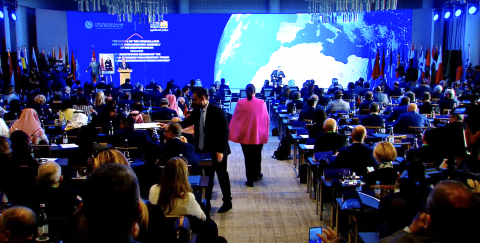
19 December 2022, Marrakesh, Marocco - The Parliamentary Assembly of the Mediterranean (PAM) concluded, on 8 December, the Constitutive Session of the Marrakesh PAM Economic Parliamentary Forum, kindly hosted by the House of Councillors of the Kingdom of Morocco.
Prior to the concluding session, the moderators of the various panels highlighted the main issues debated during the proceedings of the sectorial debates. Their remarks pointed at a widespread consensus to strengthen cooperation among all countries of the Euro-Mediterranean and Gulf regions to address together the many and multisectoral challenges in the fields of economy, finance, energy, food security, education and tourism, resulting from the Russian invasion of Ukraine, climate change, and post-Covid recovery.
Their remarks reiterated the need to strengthen economic integration, create stronger trade ties, increase North-South and South-South FDIs flows, create a network that promotes and spreads technological innovation, encourage private-public partnership, and increase investments in youth and women’s economic empowerment. The objective is to create an integrated Euro-Mediterranean and Gulf Economic Zone, characterized by free trade and legislative harmonization to promote investments and long-term economic prosperity.
On Energy Security and Green Transition, delegates agreed on the need to establish a Euro-Mediterranean and Gulf Energy Community. The meeting offered an opportunity for participants to share best practices and proposals on energy efficiency, renewable energy, and sustainable development with the aim of bringing forward the green transition and guaranteeing energy autonomy. To this end, the PAM Economic Panel shall be instrumental and will serve as an aggregator for the relevant stakeholders in the process of establishing this community, as done in the past for the establishment of MEDREG and MED-TSO.
Successively, the issue of Food Insecurity was addressed, and once again, its main causes were rooted in climate change, the Covid-19 trade disruptions, and the consequences of the Russian invasion of Ukraine. In this context, consensus was reached on the need for PAM to continue to support the Black Sea Initiative and promote the process of regionalisation of value chains.
On finding regional and international solutions for empowering women and youth, they are and remain key actors to ensure a speedy economic recovery of the regions. Participants also agreed on the necessity to implement concrete policies to advance gender equality, such as, among others, Gender Sensitive Budgeting strategies, harmonised and harsher legal frameworks for violence against women, and simultaneously increase in youth and women participation in the political decision-making process.
The theme of digitalisation and infrastructural bottlenecks was addressed as an issue having a dual nature. It was agreed that digitalization represents a new opportunity for societal changes, but also a concrete challenge to equality, posing a number of ethical and security concerns, especially in its AI dimension. Nonetheless, delegates recalled that access to the internet and digital facilities is a fundamental tool to reduce inequalities and to generate economic prosperity. In this context, the role of parliamentarians and PAM is crucial in creating a regulatory framework that can help gain access to digital and financial tools, especially in low-income countries.
On the topic of tourism, recognised as the most important source of income in the Euro-Mediterranean and Gulf regions, including for the number of informal jobs involved, delegates agreed on the importance of embracing alternative and sustainable practices in the sector. Tourism, despite its central role in the regional economies, is a very resource-absorbing economic activity. Therefore, participants concluded that the tourism industry should be encouraged to prosper, while preserving the regions’ Blue Economy potential, in a framework of regional cooperation to reduce water waste, pollution and marine litter.
PAM President, Hon. Pedro Roque (Portugal), at the conclusion of the conference read the Recommendations of the PAM Presidency, in which the key follow-up actions by the Assembly were listed, including inter alia the need for all PAM countries to ratify a number of important Conventions, as well as a detailed preliminary action plan for future initiatives.
Finally, H.E. Hon. Enaam Mayara, President of the House of Councilors of the Kingdom of Morocco, delivered his concluding remarks. He reiterated Morocco’s commitment to cooperating with PAM and with PAM’s Member States in economic, cultural, environmental, and sustainable development matters, and welcomed PAM’s efforts to reinforce collaboration with GCC countries. In this context, Hon. Mayara recalled Morocco’s 56 bilateral and multilateral Free Trade Agreements (FTAs) with a number of countries attending the Forum, and the need to investigate strategies to benefit and generalize these agreements in the framework of a reinforced regional and multilateral economic cooperation.
In addition, Hon. Mayara concluded that the Forum should represent a first step of a renewed integration process for the regions. He expressed the intention to institutionalise the Forum and to render it a permanent, annual international appointment to discuss the most pressing economic and environmental issues for the regions, with the aim of relaunching the South-South and North-South cooperation.
President Mayara thanked all delegates for having recognized in their remarks the PAM Marrakesh Forum as a strategic platform for discussion and assessment of the economic situation in the Euro-Mediterranean and Gulf regions.//